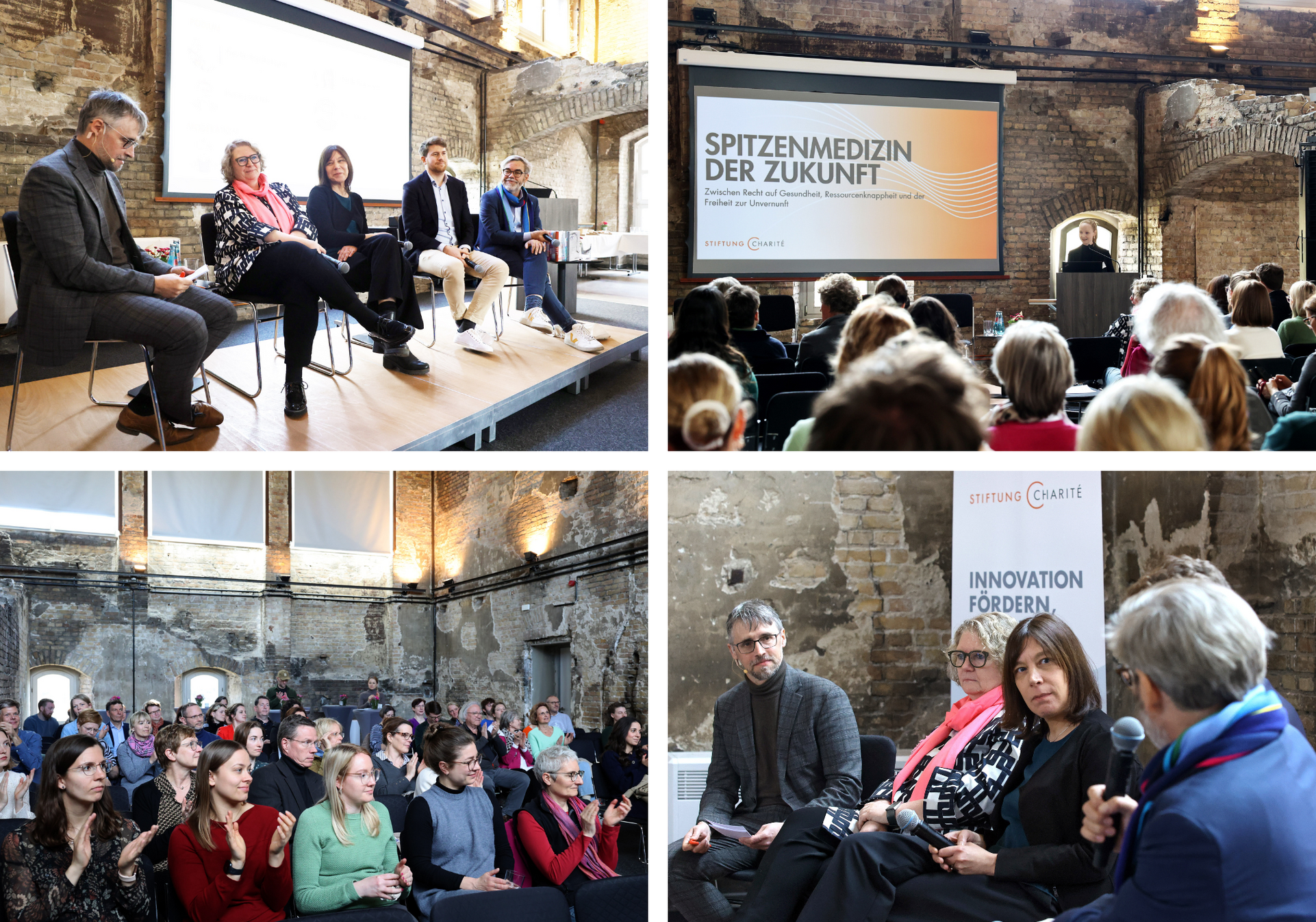Medicine of Excellence in the Future – Between the Right to Health, Resource Scarcity, and the Freedom to be Unreasonable
“Life is always – life-threatening,” German writer and poet Erich Kästner laconically observed. This wisdom remains true today. But in our modern world, how much risk can we, should we, or do we want to accept?
In the context of consciously or unconsciously made decisions, where are the boundaries between one’s own right to, or even responsibility or duty for health on the one hand, and the freedom for individual lifestyle choices on the other? Moreover, what decisions do we make as a society, including politically – for example, regarding the further development of statutory health insurance?
We discussed these and other complex questions on April 8, 2025, with our guests. As part of the 16th Berliner Stiftungswoche, Stiftung Charité invited the public to the lecture hall ruins of Charité’s medical history museum, and Berliners came out in large numbers.
On the panel, Henning Stötefalke (head of Berlin office, DAK-Gesundheit) and literary author David Wagner, who has experienced top-tier medicine firsthand as a transplant patient, spoke with pediatric oncologist and clinic director Prof. Dr. Angelika Eggert and medical ethicist and Vice Dean Prof. Dr. Susanne Michl, both from Charité – Universitätsmedizin Berlin. Sascha Karberg (journalist, Der Tagesspiegel) moderated the discussion.
Prof. Dr. Angelika Eggert (pediatric oncologist and clinic director, Charité – Universitätsmedizin Berlin) emphasized the concept of prevention during the discussion:
“The medicine of the future is the shift toward keeping people healthy. We need to move away from taking action only when diseases have already progressed and become symptomatic. This is the only viable path for our aging society. Everything else is simply not financially sustainable. With so-called liquid biopsies, for example, we now have powerful tools at our disposal – instruments of precision diagnostics that can help us intervene before suffering occurs. But to bring this to the broader population, to those who are not yet patients, we still lack adequate funding. Prevention is currently only supported very selectively in our system.”
Prof. Dr. Susanne Michl (medical ethicist and Vice Dean, Charité – Universitätsmedizin Berlin) emphasized that medicine does not only have to be excellent when performing what may be technically highly complex procedures, but also in the care before and after e.g. surgical intervention, right from informed consent to rehabilitation:
“Top-tier medicine for me is a very needs-based, patient-centered approach. Every therapy is, to some degree, an imposition on the person experiencing it. Healing may be the ultimate goal, but quality of life often decreases initially. That is why it’s so important that patients, as experts of their own lives, can clearly express their needs at each stage of treatment, and that care plans are holistic – which doesn’t necessarily mean they have to be expensive.”
Henning Stötefalke (head of Berlin office, DAK-Gesundheit) took a systemic look at the costs of current developments and the opportunities for the future:
“We must preserve excellence in medicine while maintaining broad access, and continue developing this spectrum of medical possibilities for everyone through solidarity. I believe it’s no longer accurate to claim we have the world’s best healthcare system. We’ve lost that status – and we need to regain it. We’re seeing tremendous waste of resources; we have far too many hospitals providing too many non-specialized services; our access to pharmaceuticals is certainly suboptimal, and critics would argue we have too many health insurance companies as well. However, discussions about cutting services are extremely unpopular. In reality, such debates aren’t necessarily required. A better approach would be to first maximize efficiency within the current system before we start talking about rationing.”
David Wagner (author and transplant patient) spoke vividly and against the background of his own illness experience about the obvious limits of solidarity in German society:
“Unfortunately, money cannot solve everything. Take transplantation medicine as an example: So many people in this country die while waiting for organs. We have a severe shortage of donated organs. This effectively means that triage is already happening in this field today. Particularly in transplantation medicine, Germany is sadly far from being a leader. We can’t even achieve the European average for organ donation rates. The introduction of an opt-out system seems politically impossible, despite being long overdue. Do we really want to be a society that only takes without giving? Each of us should ask ourselves this question critically.”
Following the panel, the experts continued the discussion with the audience: about the future design of the healthcare system, potential opt-out solutions for data and organ donations, the place of palliative care alongside curative medicine, and the connections between education and health. Beyond the technological possibilities already available today, a physician from the audience emphasized her daily professional aspiration: “We must strive for excellence not just in technology, but in our humanity as well!”
